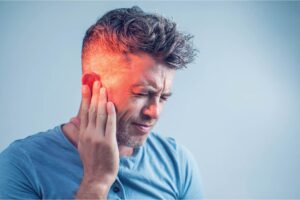What Can Cause Sound Sensitivity?

Do you find it difficult to deal with normal sounds throughout the day? For example, you might be irritated by sounds that are happening around the house or office – but these noises don’t seem to bother other people around you.
This condition is known as hyperacusis: sound sensitivity. If you are affected by this issue, then it might be time to talk to a hearing specialist for help.
What is Sound Sensitivity?
Hyperacusis is a condition that results in decreased sound tolerance. Patients find that their sensitivity to normal environmental sounds increases, which can have an undeniable impact on all areas of life.
When you are sensitive to normal sounds, it can take a toll on your social life, career, and even casual activities at home. Simple activities such as watching TV, driving a car, or talking to a friend are hard to manage.
Sound sensitivity makes you uncomfortable or even miserable during everyday activities. You find that the sounds around you are intolerable, and it’s often difficult to listen to other people’s voices or the usual noises happening in the house.
Types of Hyperacusis: Sound Sensitivity
Patients with sound sensitivity fall into two categories:
- Cochlear: Symptoms of cochlear sensitivity include a general intolerance for environmental sounds, as well as frustration and pain in the ear. This is the most common type of sound sensitivity.
- Vestibular: When certain sounds are happening, this type of sensitivity can result in more severe symptoms, such as imbalance, nausea, and/or dizziness.
Regardless of the type of sound sensitivity you have, it can result in a domino effect in your life. Both types of hyperacusis can cause depression, stress, anxiety, and social isolation. Some people develop phonophobia, which is a fear of normal sounds.
Symptoms of Hyperacusis
Are you experiencing sound sensitivity? Then you might notice a variety of symptom, such as:
- Volume is Turned Up: Regular activities around you seem unusually loud. It’s like the volume is turned up high for everything happening around you.
- Unbearable and Painful: The environmental noises seem so loud that it is a painful or unbearable experience for you to hear.
- Tinnitus or Ringing: Some patients find that their sound sensitivity also accompanies tinnitus – ringing in the ears.
- Irritability: The unbearable noises that are happening around you can take a toll on your mood. Patients with sound sensitivity often find that they are irritable when spending time around other people.
- Pain in the Ear: Sometimes the noises are so intense that it causes a painful sensation in one or both ears.
- Sensation of Fullness: You might notice irritation because of a sensation of pressure or fullness in the ears.
- Loss of Hearing Range: Pay attention to your hearing range, because you might find that you have difficulty with the ability to deal with sudden changes in volume, known as your dynamic range of hearing.
What Causes Sound Sensitivity?
Sound sensitivity is a condition that can affect one or both ears. Also, people of all ages can be affected by this condition. Most of the time, a person isn’t born with sound sensitivity – it is something that happens. You might have a sudden onset of hyperacusis. Or, it can start small and gradually worsen over time.
A variety of causes could be related to the development of sound sensitivity:
- Head or brain injury
- Migraines
- Lyme disease
- Meniere’s disease
- Multiple sclerosis
- Bell’s palsy
- Car accident with airbag deployment
- Viral infection affecting the inner ear
- Damaged cochlea from loud noise exposure
- Ear damage resulting from medication or toxin exposure
- Temporomandibular joint disorder (TMJ)
- Post-traumatic stress disorder (PTSD)
Each patient is unique, and it’s not always possible to identify the cause of sound sensitivity. Doctors don’t understand why exactly sound sensitivity happens. But many experts suspect that there is a malfunction or damage affecting the auditory nerve, central processing system, or mechanisms within the ear.
Treatment Options for Sound Sensitivity
Patients are disappointed to hear that there isn’t a treatment to quickly eliminate sound sensitivity. But there are various options that can help you cope with the uncomfortable sounds. The goal with treatment is to improve your quality of life as much as possible.
You might choose to wear ear protection (such as earmuffs or earplugs) to muffle noises if you are spending time in a loud environment, like a concert or large social gathering.
Some providers offer sound therapy to retrain the auditory processing center in the brain. But this treatment method isn’t always effective.
Additionally, it’s also important to identify any other underlying health issues that might be causing sound sensitivity. If you are using medication that affects the hearing, then it might be necessary to switch medications or change the dosage.
Many people who have sound sensitivity also find it helpful to talk to a therapist for help. You can work through underlying anxieties or fears if these things are having a negative impact on your social activities.
Recruitment vs. Hyperacusis
Keep in mind that general sound sensitivity is different than recruitment – a condition that happens when someone is losing their hearing. Recruitment results in certain sounds being uncomfortably loud, but it typically only affects the perception of sounds within the frequency range of hearing loss.
In comparison, sound sensitivity isn’t limited to certain frequencies. Hyperacusis affects all sounds, making everything seem louder than it actually is.
An audiologist can complete a thorough sound test to determine the type of sensitivity you are having. It’s important to diagnose your sensitivity so the medical team can design an ideal treatment plan to improve your hearing.
Sound Sensitivity: Is it Common?
This hearing condition isn’t common, but it can affect people of all ages. Some patients find that it’s simply a minor annoyance, but the sensitivity doesn’t interrupt their regular activities. They are able to live a happy life and manage the sensitivity throughout the day.
On the other hand, some people struggle to live with the symptoms of sound sensitivity. If you find that you have a hard time in any area of your life because of your sensitive ears, then it’s time to talk to a hearing specialist for a diagnosis and treatment.
Schedule a Hearing Consultation
Do you need to talk to an audiologist? Our team at Fairfax Hearing Center is here to assist. Contact us to book an appointment and hearing test.

